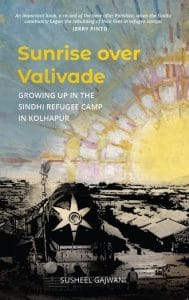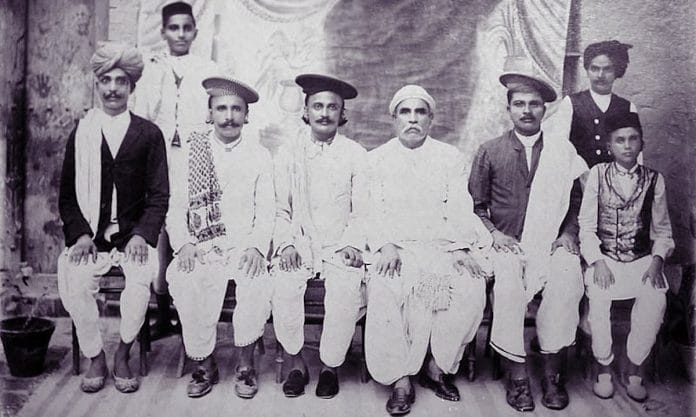The Collector was due at 10 o’clock. He would first spend time in the office, discussing administrative details. He would then walk around the camp on an inspection with the commandant and other staff. There was a possibility that he would then address the refugees before leaving. At 12 he would be on his way to his next duty.
Collector Nanjappa was well known to be short-tempered and ruthless. His actions and behaviour had built up a reputation, and had spread throughout Kolhapur district. He arrived on the dot of time.
As planned, he was escorted around the barracks by district officials, the commandant and the government paraphernalia. The sanitary department had outdone themselves! Bajo, Lachhu, and eight others walked closely together, following the entourage. The Collector was protected on all sides, and they did not get a chance to so much as catch his eye.
By a quarter to twelve, a large crowd had gathered outside the office, waiting. Arriving back at the office, the Collector was somewhat alarmed to see that there were more than one hundred and fifty refugees gathered there. He asked the district officer, “What is going on?”
The DO addressed the crowd, “Why are so many of you standing here? Can’t you see that Saheb is busy? Move out of the way, he has to leave.”
Bajo came forward and explained, “It’s milk powder, saheb. We are being given excuses instead of milk powder for a long time.”
“Yes excuses,” endorsed Lachhu.
“What are you trying to say? Are you accusing us of not doing our job?” the DO asked belligerently.
“Saheb, you do not know our difficulties, that’s why …”
“We do not know your difficulties? What do you mean by saying that? Who do you think is running the administration here?” the DO shouted.
“Rabb bless us if this is how you run the administration.”
Also read: Indian middle class was once an agent of change. It now takes comfort in militant nationalism
“Be grateful to the government that you are still alive!” the DO said rashly.
“You want us to be grateful to the government that has made us homeless? The government that gave our entire land of Sindh to Pakistan, you want us to be grateful to that government? The government that did not think of our children, our language, our traditions, you want us to be grateful to that government? The government that has converted us into a mass of refugees, you want us to be grateful to that government? And you … you are puppets of that government!” Bajo had been staying calm and silent all this while and could no longer restrain his emotions.
“Mind your tongue!” the District Officer was furious.
“Teach your staff to mind their tongue, first,” retorted Bajo.
“That’s not your job, it’s mine.”
“Then you’d better learn to do your job. Do you know the basic needs of this camp?”
“Why would they know? The milk-powder tins, that are meant for us, are sold to shops at half price,” Lachhu shouted.
“Shut up,” the District Officer was infuriated beyond words.
“Is it because we are refugees that you are treating us so shabbily?” Bajo questioned him.
The Collector, who had been waiting for the exchange to 172
resolve itself, felt obliged to intervene. He shouted, “How dare you speak like that to my officer! What do you want?”
“It’s simple,” said Bajo. “We must get the things that the government sends for us.”
“Essential commodities are sent for us by the government, but they vanish at some point on the route and we do not get them,” said Lachhu. “Where does the ration go?”
“How does the milk powder disappear?” Lollu asked.
“Grabbing the things sent for us, is that your idea of doing your duty?” Bansi.
A barrage of questions rained from all sides, louder and louder. Collector Nanjappa lost his balance.
“You rascals … bloody refugees … you deserve to starve! Bastards … haraami saalay … how dare you question us!”
These words inflamed a young man in the crowd and he rushed towards the Collector. The District Officer blocked him, hitting a hard blow on his face. Seeing Bansi fall to the ground, the mob was infuriated and began flinging stones and other objects. A stone struck the Collector’s forehead, drawing blood.
“Eh you bloody nirvaasitaano!” screamed the District Officer. “Bloody tribe of filthy refugees!”
But nobody was listening. The Collector and District Officer were surrounded by the mob.
“Inspector!” shouted the Collector, “Fire into the air! Now! It’s an order!”
No sooner did the Collector shout the order than the inspector drew his revolver and fired.
But not in the air. He fired straight at the mob.
The bullet hit a nineteen-year-old young man. He collapsed on the spot, and died. It was Lachhu. The mob froze and a wail rent the air. The inspector had already fired another bullet. It hit forty-year-old Naomal in the right foreleg. He crashed to the ground, gasping for breath, and screaming loudly and horribly in pain.
Nanjappa saw the deep red gushes spurting out of Lachhu’s lifeless body. He ordered the inspector to stop firing.
The Collector and the Camp Commandant stood staring at the scene. Who could ever know what was going through their minds? For those who were present that day, the Collector appeared to be angry, frustrated and ready to throw a fit. He was clearly furious at the man who had fired into the crowd, despite the clear orders to fire in the air. Well, it was over now, nothing could be done. Bloody refugees, he must have been thinking – this should teach them a lesson.
The Camp Commandant, in contrast, was clearly shocked and disbelieving and utterly disconsolate. His reaction showed on his face and the way he was shaking his head in horror and regret: What a terrible thing to happen – a tragedy that could easily have been avoided. All it required was restraint and a few soothing words for these poor fellows. Did anybody here understand what they had been through? Could anybody here even dream of what it felt like to be transplanted from their homes without warning to a place where they were shunned? They had been through a very difficult time, and had faced their travails with so much patience and fortitude. Why weren’t they given the respect they deserved?
But there was nothing he could do, and he stood there, staring ahead helplessly.
 This excerpt from ‘Sunrise over Valivade: Growing up in the Sindhi refugee camp in Kolhapur’ by Susheel Gajwani has been published with permission from black-and-white fountain.
This excerpt from ‘Sunrise over Valivade: Growing up in the Sindhi refugee camp in Kolhapur’ by Susheel Gajwani has been published with permission from black-and-white fountain.






